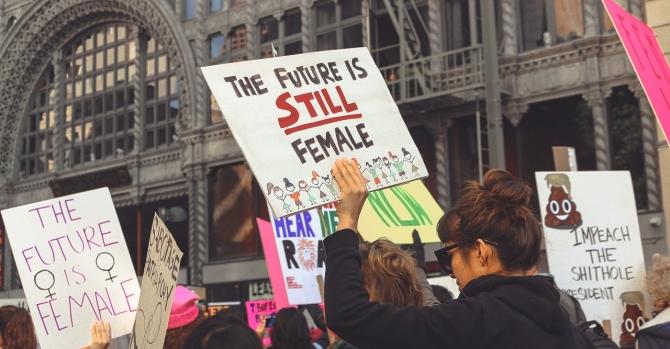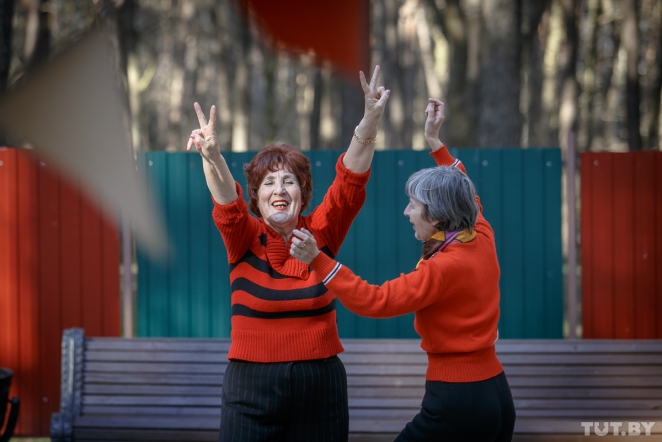A Lesson Belarusian Babushkas Can Teach To Western Feminists, Opinion By A Swede
BelarusFeed
26 June 2019, 14:55
 I remember hearing a story about a man who fled to his grandmother after watching the Twin Towers collapse on September 11, 2001. While he and the rest of the world saw their reality crumble in shock, he noticed how remarkably calm his grandmother was. She was more concerned with making him dinner than sharing the shock.
I remember hearing a story about a man who fled to his grandmother after watching the Twin Towers collapse on September 11, 2001. While he and the rest of the world saw their reality crumble in shock, he noticed how remarkably calm his grandmother was. She was more concerned with making him dinner than sharing the shock.
Later, he understood that what she demonstrated was the character of someone who had seen the world burn twice in two World Wars and two presidents getting shot, among other things. Those events didn’t end the world, and neither would that.
I have observed similar character in the babushkas of Belarus – that kind of attitude to life where you go with your back straight and your head high regardless of circumstances. Letting the hard times carve wise lines in your face instead of letting them break your spirit.
Western Feminism
The feminism that is raging across Sweden and large parts of Europe is no longer about achieving equality and justice, which is something that all healthy countries should and often do naturally strive for.
Feminism has become a political ideology that is aimed at actively choosing to see the world from one specific perspective, where any criticism or attempt to have a rational discussion will be condemned.
According to the feminist movement I’m describing, the world is naturally unjust, divided into oppressors and the oppressed. Men oppress women, not for any rational reason, just for the sake of belonging to the group of men. This is how the world works, and this is the root of all evil in the world. Much like Marx argued, the bourgeoisie oppressed the proletariat, and although the names of the classes have changed, the idea remains the same for the feminists. The good guys versus the bad guys.
The World Bank recently named Sweden the most equal country in the world, together with four other countries. Scoring the maximum 100 points possible, Sweden should seem like an extraordinary triumph of civil rights and social progress. Yet, many women in my country still feel genuinely oppressed, pointing fingers on almost every aspect of life and blaming the patriarchy.
Statistically, men constitute 95% of all plumbers in Sweden, but in the eyes of the feminists, the statistic is a manifestation of men’s oppression against women, a group of plumbers that have conspired to keep women away from their sewage pipes.
The feminist movement spills over into every possible area; to why boys always play with guns while girls play with dolls, why boys wear blue clothes and girls always wear pink clothes. It as though, the more obscure and more complex the debate becomes, the more it feeds the feminist movement.
Instead of focusing on real problems, they dig themselves into ideological trenches, shooting at invisible enemies. It is in those moments that the ideals and values of the Belarusian babushkas can perhaps give some guidance in the often, confusing, times that can follow in the backwaters of the neo-feminists’ ravages.
Babushkas Feminism
There are other ways to go through life. I was riding the trolleybus in Grodno recently when I accidentally blocked a woman and her son from getting on. I didn’t see that I was in their way, and I didn’t hear them either in the busy morning rush.
Moments later, a babushka came up to me, tapped me on the shoulder, and asked me what the hell I was doing, treating a woman and her son like that. I was confused and couldn’t understand what she was upset about. In her eyes, it must have seemed as though I was deliberately blocking them from entering the trolleybus. The conversation went on for a good minute before she finally stopped.
Later, I thought about that babushka. I wasn’t only embarrassed by my mistake but impressed by the character of the woman. Then it hit me, it was something very refreshing in the way the babushka approached the problem.
This babushka had seen the Nazi’s on her doorsteps, she had rebuilt her country, and seen her reality swept away under her feet in the rise and fall of the Soviet Union.
Unimaginable economic stress, historical scars from a tough life persevered throughout the decades. She has all the reasons to blame men, but she doesn’t blame at all. She gracefully faces the world by walking with her back straight and with a character that refuses any victimization.
The babushka understands that the world is not black or white, that there is a danger in ideologies that try to divide people into good and evil. Life is mostly a series of grey zones where most people are decent and try to do their best to get by, neither evil nor genuinely good.
Equality and justice come from the strength of the characters in the people, by having a moral sense of what is fair and just. Equality and justice do not come from ideologies that refuse other opinions or thoughts, whether it be neo-feminists or old school communists.
The Belarusian babushka has seen ideologies come and go, all telling the same thing, we are right, they are wrong. Yet, she stands firm, just like that babushka in New York, despite the collapse of the Twin Towers, her character never caved in. There is something very honorable in that.
The Belarusian society will develop, and equality will increase, economically and socially. These inevitable changes will lead to questions being asked, and demands being raised. And once they do, I hope that they keep a little bit of the spirit of the Belarusian babushka.
Text by Simon Öhman. The views expressed in this article do not necessarily reflect the opinion of the editorial staff.
26 June 2019, 14:55

Image by miawicks9 from Pixabay
Later, he understood that what she demonstrated was the character of someone who had seen the world burn twice in two World Wars and two presidents getting shot, among other things. Those events didn’t end the world, and neither would that.
I have observed similar character in the babushkas of Belarus – that kind of attitude to life where you go with your back straight and your head high regardless of circumstances. Letting the hard times carve wise lines in your face instead of letting them break your spirit.
Western Feminism
The feminism that is raging across Sweden and large parts of Europe is no longer about achieving equality and justice, which is something that all healthy countries should and often do naturally strive for.
Feminism has become a political ideology that is aimed at actively choosing to see the world from one specific perspective, where any criticism or attempt to have a rational discussion will be condemned.
According to the feminist movement I’m describing, the world is naturally unjust, divided into oppressors and the oppressed. Men oppress women, not for any rational reason, just for the sake of belonging to the group of men. This is how the world works, and this is the root of all evil in the world. Much like Marx argued, the bourgeoisie oppressed the proletariat, and although the names of the classes have changed, the idea remains the same for the feminists. The good guys versus the bad guys.
While watching the sometimes, chaotic, feminist movement in the west, I realize that somewhere along the line, women stopped being victims but still cling on to the role
The World Bank recently named Sweden the most equal country in the world, together with four other countries. Scoring the maximum 100 points possible, Sweden should seem like an extraordinary triumph of civil rights and social progress. Yet, many women in my country still feel genuinely oppressed, pointing fingers on almost every aspect of life and blaming the patriarchy.
Statistically, men constitute 95% of all plumbers in Sweden, but in the eyes of the feminists, the statistic is a manifestation of men’s oppression against women, a group of plumbers that have conspired to keep women away from their sewage pipes.
The feminist movement spills over into every possible area; to why boys always play with guns while girls play with dolls, why boys wear blue clothes and girls always wear pink clothes. It as though, the more obscure and more complex the debate becomes, the more it feeds the feminist movement.
Instead of focusing on real problems, they dig themselves into ideological trenches, shooting at invisible enemies. It is in those moments that the ideals and values of the Belarusian babushkas can perhaps give some guidance in the often, confusing, times that can follow in the backwaters of the neo-feminists’ ravages.
Babushkas Feminism
Related image, TUT.BY
There are other ways to go through life. I was riding the trolleybus in Grodno recently when I accidentally blocked a woman and her son from getting on. I didn’t see that I was in their way, and I didn’t hear them either in the busy morning rush.
Moments later, a babushka came up to me, tapped me on the shoulder, and asked me what the hell I was doing, treating a woman and her son like that. I was confused and couldn’t understand what she was upset about. In her eyes, it must have seemed as though I was deliberately blocking them from entering the trolleybus. The conversation went on for a good minute before she finally stopped.
Later, I thought about that babushka. I wasn’t only embarrassed by my mistake but impressed by the character of the woman. Then it hit me, it was something very refreshing in the way the babushka approached the problem.
She didn’t see herself as a victim, she didn’t see me as a manifestation of men’s oppression against women, she didn’t look at me as a representative of a gender war
This babushka had seen the Nazi’s on her doorsteps, she had rebuilt her country, and seen her reality swept away under her feet in the rise and fall of the Soviet Union.
Unimaginable economic stress, historical scars from a tough life persevered throughout the decades. She has all the reasons to blame men, but she doesn’t blame at all. She gracefully faces the world by walking with her back straight and with a character that refuses any victimization.
The babushka understands that the world is not black or white, that there is a danger in ideologies that try to divide people into good and evil. Life is mostly a series of grey zones where most people are decent and try to do their best to get by, neither evil nor genuinely good.
Equality and justice come from the strength of the characters in the people, by having a moral sense of what is fair and just. Equality and justice do not come from ideologies that refuse other opinions or thoughts, whether it be neo-feminists or old school communists.
The Belarusian babushka has seen ideologies come and go, all telling the same thing, we are right, they are wrong. Yet, she stands firm, just like that babushka in New York, despite the collapse of the Twin Towers, her character never caved in. There is something very honorable in that.
The Belarusian society will develop, and equality will increase, economically and socially. These inevitable changes will lead to questions being asked, and demands being raised. And once they do, I hope that they keep a little bit of the spirit of the Belarusian babushka.
Text by Simon Öhman. The views expressed in this article do not necessarily reflect the opinion of the editorial staff.


